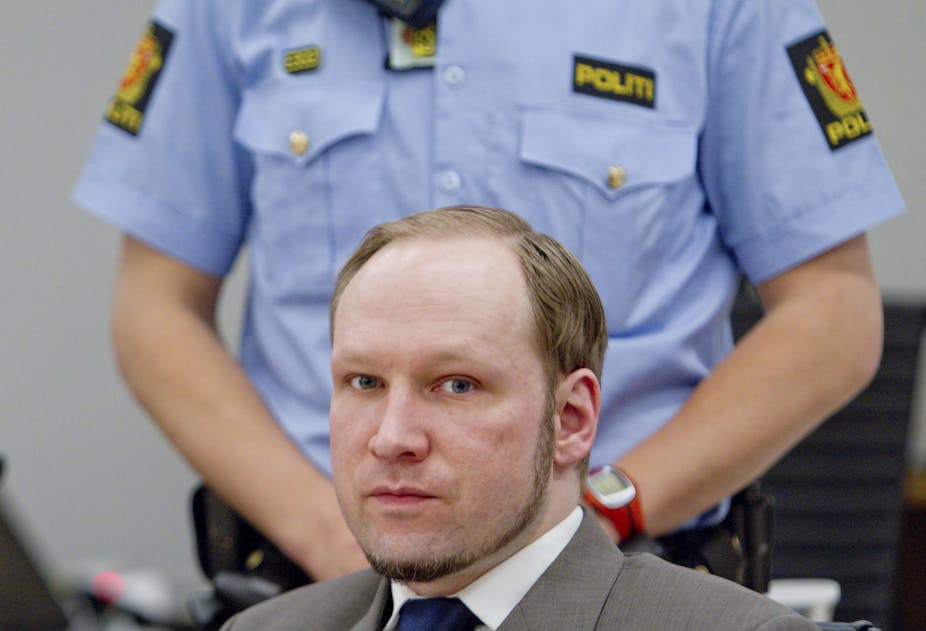Anders Breivik ensured his place in history the day he shot dead 69 people on a small Norwegian Island, having earlier killed eight others with a bomb planted in government offices in Oslo.
Breivik’s horrendous crimes were driven by his espoused extreme right-wing political ideals, so it is perhaps not surprising that his enrolment in political studies subjects at the University of Oslo has attracted international attention.
Breivik is not the first mass murderer to undertake university study from a maximum security cell – Julian Knight, the Hoddle Street Massacre killer, completed a Bachelor of Arts degree while still in prison, majoring in in strategic and defence studies.
While Anders Breivik was not accepted into a full degree and will only study isolated subjects, his case raises some fundamental questions about prisoners’ rights to access education whilst incarcerated.
Certainly prisoners like Anders Breivik and Julian Knight are extreme examples in almost every way.
For a start, most people in prison arrived there through far less heinous actions. Unlike Knight and Breivik, most prisoners will not remain imprisoned for decades at a time. On the latest data, only around 5% of Australian prisoners are serving a life sentence or other indeterminate sentence. The median expected time to serve for sentenced prisoners is just under two years; while a third of prisoners had an aggregate sentence, including time likely to be spent on parole, of less than two years.
The reality is that most people who go to prison will leave and return to the community. Education has role to play in rehabilitating these offenders but it also has a lot to do with why they may be there in the first place. The links between education, employment and offending are long established. Numerous studies have shown a lack of education to be a clear risk factor, which can predict the likelihood of a person offending.
Having little formal education can exacerbate employment prospects and lead to unstable accommodation, social isolation, and negative social relationships. It is no coincidence that many prisoners are illiterate.
Research has also long demonstrated that prison education programs reduce the likelihood of people returning to prison, a recent analysis found a 43% reduction in recidivism for participants. With rates of recidivism around 50% or more for some groups, anything that reduces the risk of re-offending cannot be a bad thing.
But prison education is not a magic bullet and other factors in released prisoners’ lives – such as mental health, drug use, further offending and the fact of having been in prison – can affect their chances.
Nonetheless, education is and should be a core element of correctional systems throughout Australia and across the world. Educational programming ranges from basic literacy and numeracy through to vocational training and higher school courses – all intended to help equip prisoners with the skills and knowledge to have a better chance of succeeding back in the community.
Recent Australian research shows that prisoner education can also have positive labour market outcomes. Other research has found prisoners completing academic or vocational education had odds of post-release employment 13 to 28% higher than those not participating.
Even for prisoners who are unlikely to ever be released, having access to education plays a valuable role in making time spent in prison meaningful and productive.
Of course, how you think prisoners should spend their time depends on your view on the purpose of imprisonment. But most people would accept the proposition that time spent in prison should yield some benefit – to the community, the justice system, and the offender.
Education provides opportunities to benefit all these parties. If nothing else, access to education can keep long-term prisoners engaged and occupied, which tends to make them easier to manage.
The Rector of Oslo University, Ole Petter Ottersen has spoken out in support of Anders Breivik’s admission to Norway’s most prestigious university. As he noted, Norwegian prison rules are clear - all inmates, like all other citizens, are entitled to apply to study and be considered on their merit.
As Ottersen observes, there is a basic humanity in Norway maintaining its rules and principles in the face of the moral outcry arising from Breivik’s application – a humanity arguably beyond Breivik himself, but a quality that education may help him attain.
In studying political subjects, Breivik will encounter ideas of democracy, human rights and freedoms that are contrary to the views he has espoused. Whether this will ultimately have any positive effect on Breivik remains to be seen, but his case brings to light the potential for education to be positively empowering and enriching.

